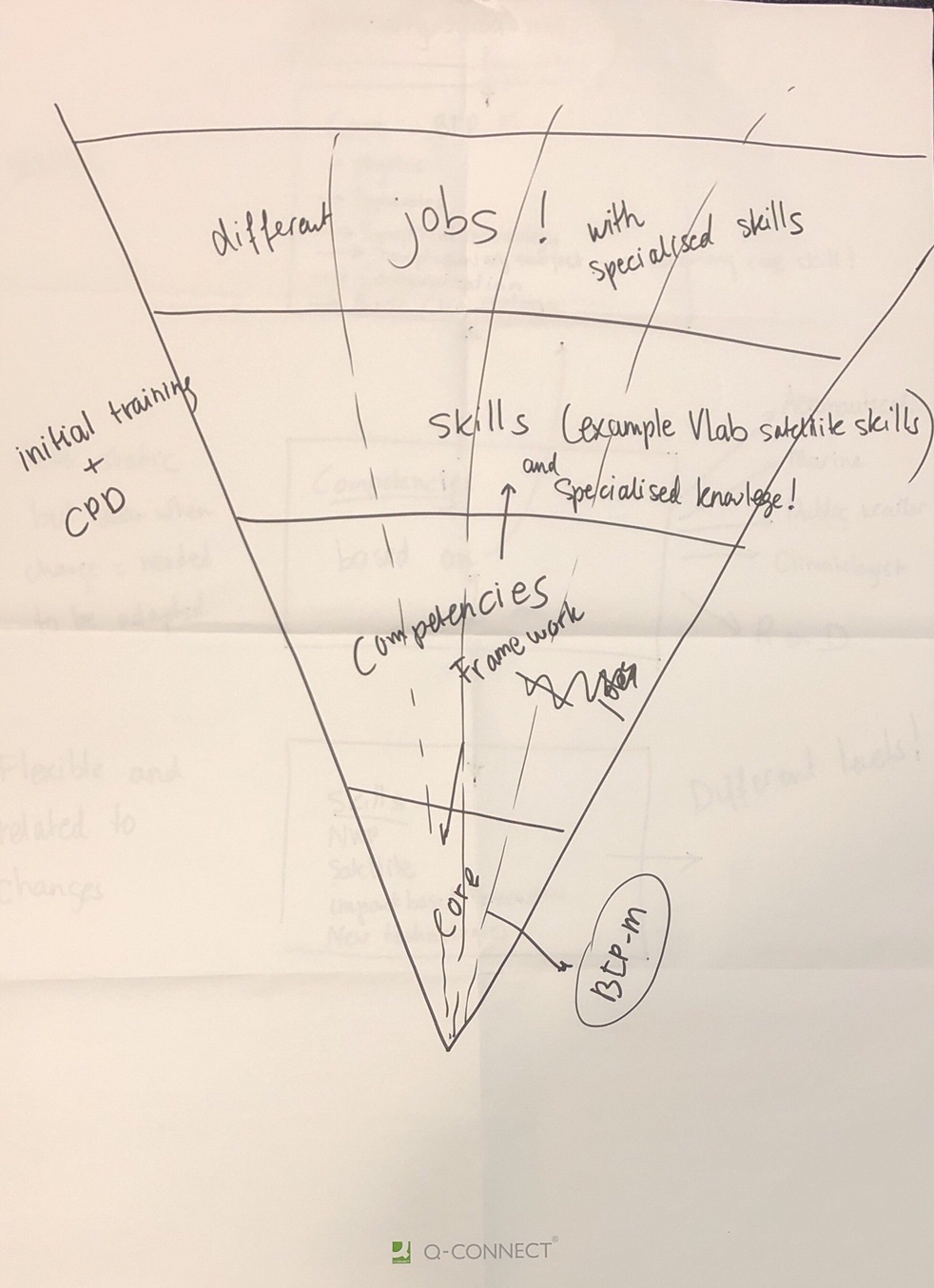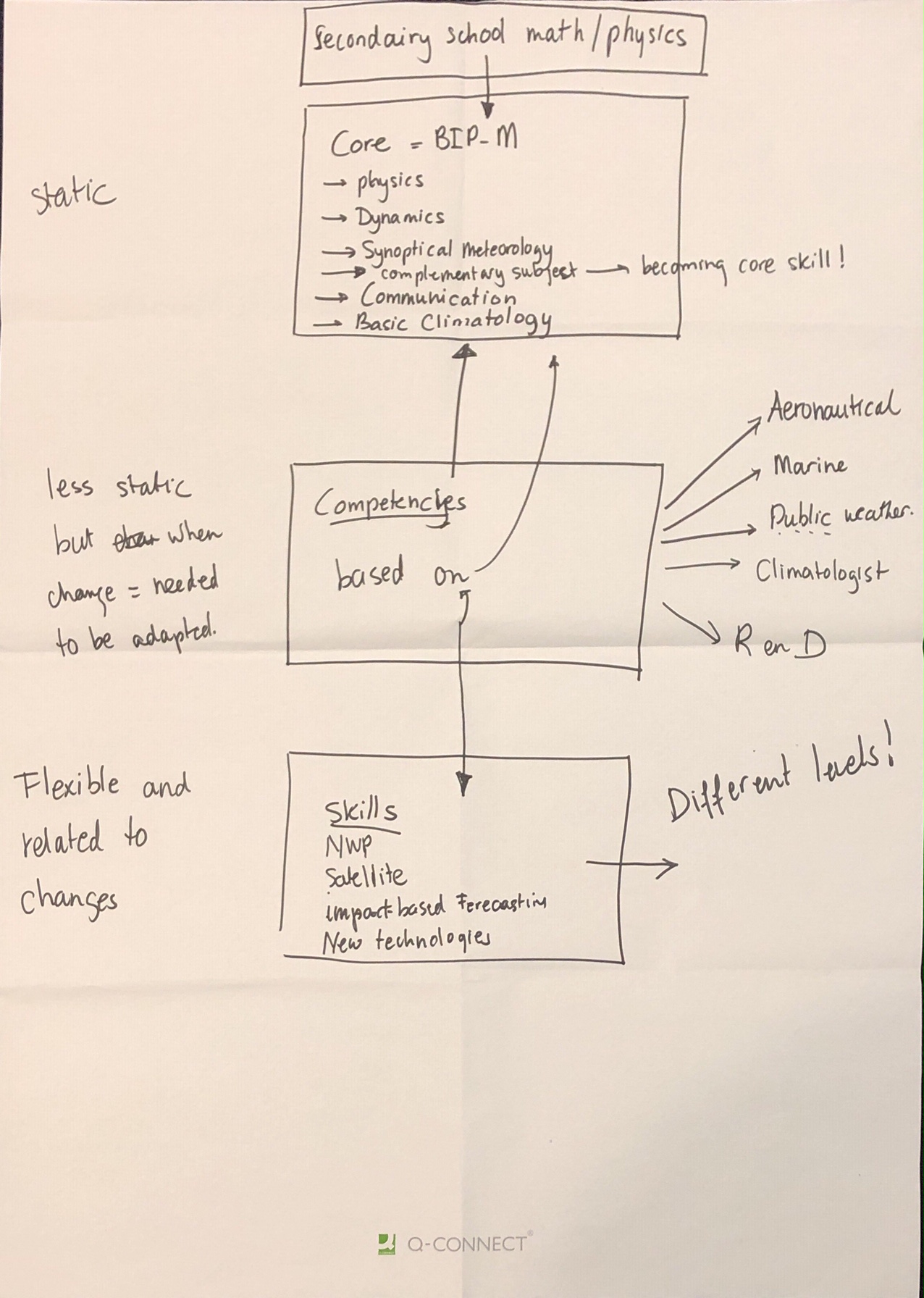Team: UK, China (secretariat), Netherlands, Caribbean, Korea, Russia. Tim for first half.
Q1. Approach and level of detail
Broadly agree that approach and level of detail are correct. Certainly far easier to use than 258.
Changes are mainly in the in detail, though. Applied/operational approach vs University programme. Possible need for two tracks, or two sets of examples/guidance for how to achieve the higher level learning outcomes . Eg derivation of eqns vs their application.
Is issue that people get lost in the detail and over-think programmes.
Detail helps with influencing management over scope of programme
KMA: Have a "Korean version" of bip. Recruit people from range of backgrounds. People working, eg in nwp, and hpc maintenance, just need general science background.
BIP for weather forecaster, not for IT, research.
Now have 5 comp frameworks, so maybe reduce BIP-M to core. Details in Comp frameworks (which change more quickly than BIP-M.
For LDCs, some MTs will become future Ms, after further education/training, so need science content of MT to provide grounding.
Upside-down pyramid to explain the diversity of job roles, built on foundation of common core knowledge, and core competencies (which have their own skills and specialist knowledge). Further, more advanced or new or just different skills are additional to these.
Even those with BSc/MSc meteorology need training in the competencies and skills required in the nation/region/context.
KMA: non-forecasting jobs increasingly specialised. People in eg ICT do not need meteorology in anywhere near the detail of the BIPs.
Keep in mind original purpose of 258 for developing nations. BIP-M gives guidance. LDCs need a less expensive, but safe option.
KA: secondary in maths, physics their minimum criteria.
SC: Degree is "optimum way of meeting requirements". Not necessarily. Competence is key.
KNMI: academic system gives ability to think in the right way. Do not want to reduce standards during moves to simplify (all agreed)
We had a discussion of level of detail needed - eg Mathematics outcomes. Guide makes people overthink programmes. What is needed for the job? Not dumbing down. Key is understanding, not the maths itself.
Tim: examples from his time teaching: temperature change - principles before maths. Sea breeze - forecasters need to be able to understand / explain whether their nwp can handle.
Down to NMS/RTC/University to decide detail of content. Top level learning outcomes mandatory.
WMO library: Too easy to find old versions. Links needed to Competency frameworks, etc, Vlab, etc. 1083 should make very clear the integrated nature of BIP-M/Competencies/National needs/Further Skills
Q2. BIP-M is core. Anything common eg communication, teamwork, in core. Need to strengthen these, and bring communications, teamwork, professional skills into core.
Service areas belong in competency frameworks.
Q. Two levels. Fine.
Some just use M. Other (Caribbean) use MT, with sub-levels in MT and M. They use MT as entry level, for people that aspire to M in future, after building further knowledge/skills.
Competency is the key - but small island nations need MTs. Ie AMO.
Q. Least developed nations.
Global campus for CPD (MT and M). Lots made available online, but also finding the right f2f training.
Content: 1083 is fine. Top level outcomes fine. Use 1083 as a guide. Make it clearer on how to map what you need/want to the BIP-M outcomes, and what the minimum requirement is - NMS/RTCs can go beyond this, but key is knowing what your country/regions wants/needs. If people need MTs, (or even AMO), then that is enough. Some countries developing new programmes aim too high in terms of taxonomic level and/or content.
Q. Assessment tool.
There is a need. But it is really at the Competency Framework level.
Need for ensuring people from 1 country are recognised in other countries.
Mapping tool (Excel) to be made an official document. But take into account needs of regions/NMSs
Exam / test - down to RTCs / NMSs to set these according to their needs. Make exemplar assessments available through Global Campus for less developed countries.


